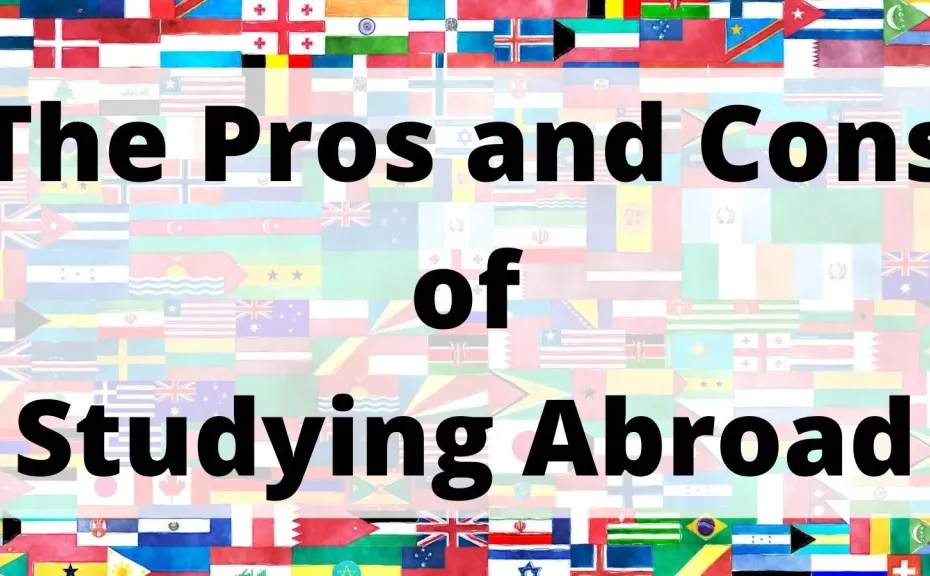Studying and working abroad has become increasingly popular in recent years, as more people seek to expand their horizons and gain valuable international experience. Whether it’s to learn a new language, experience a different culture, or enhance career prospects, studying and working abroad can offer a range of benefits.
However, it’s not without its challenges and drawbacks. In this post, we’ll examine the pros and cons of studying and working abroad, and explore factors that prospective students or employees should consider before deciding to pursue an international experience.
Pros of Studying and Working Abroad
Studying and working abroad can offer a range of personal and professional benefits. One of the biggest advantages is the opportunity to learn about new languages and cultures.
Living and working in a foreign country can help individuals to develop new language skills, gain an appreciation for diverse cultures and ways of life, and broaden their perspectives on the world.
In addition to personal growth, studying and working abroad can also provide valuable professional benefits. Many employers value international experience and see it as a way to develop skills that are in high demand in today’s globalized workforce.
These skills can include adaptability, cultural sensitivity, and language proficiency, all of which can be important in today’s global job market.
There are numerous examples of successful professionals who have gained valuable experience by studying or working abroad. For instance, Sundar Pichai, the CEO of Google, grew up in India and studied in the United States before working for Google in various roles before becoming CEO.
Another example is Angela Merkel, the former Chancellor of Germany, who studied in East Germany before pursuing a career in politics.
Studying and working abroad can also lead to better job opportunities and higher salaries upon returning home. Individuals with international experience are often highly sought after by employers, as they can bring unique perspectives and skill sets to the workplace.
Additionally, individuals with international experience may be able to command higher salaries due to their expertise and knowledge of global business practices.
In summary, studying and working abroad can provide numerous personal and professional benefits, including language and cultural immersion, personal growth and independence, and valuable professional skills and experiences.
These benefits can translate into better job opportunities and higher salaries upon returning home, making the international experience an attractive option for many.
Cons of Studying and Working Abroad
While studying and working abroad can offer many benefits, it’s important to also consider the challenges and drawbacks. One of the biggest personal challenges is homesickness, as individuals may miss their families, friends, and familiar surroundings.
Would You Like To Apply For This Jobs/Sponsorship?
Enter Your Email Address HERE & You Will Receive a Notification About Your Application. If it shows "Subscribed" CLICK HERE to follow on Telegram for updatesAdditionally, culture shock can be a significant issue, as individuals may struggle to adjust to new customs, languages, and social norms. This can lead to feelings of loneliness and isolation.
In terms of professional challenges, individuals may struggle to adapt to different work environments, particularly if there are significant cultural or language barriers.
Navigating unfamiliar legal systems can also be challenging, as individuals may not be familiar with local laws and regulations. These challenges can be particularly daunting for individuals who are new to the workforce or who are pursuing careers in highly specialized fields.
There are numerous examples of individuals who have struggled with the difficulties of studying or working abroad. For instance, in 2018, a group of Chinese students studying in the United States reported feeling isolated and depressed due to cultural differences and language barriers.
Additionally, a study by the University of Essex found that many international students in the UK experience high levels of stress and anxiety due to cultural differences and academic pressure.
It’s also important to note that studying or working abroad may not necessarily lead to better job opportunities or higher salaries upon returning home.
In some cases, individuals may find it difficult to find work in their home country due to a lack of relevant experience or local connections. This can be particularly challenging in highly competitive job markets.
In summary, studying and working abroad can be challenging, particularly in terms of personal and professional adjustments. Individuals should carefully consider these challenges before pursuing an international experience, as well as the potential difficulties in finding work in their home country after returning.
Factors to Consider Before Studying or Working Abroad
Before deciding to study or work abroad, it’s important to carefully consider a range of personal and professional factors. One of the most important personal factors to consider is family and social ties.
Individuals should consider how their decision to study or work abroad will impact their relationships with family and friends, as well as their ability to maintain important personal connections.
Another important factor to consider is personal values and priorities. Individuals should reflect on their own goals, aspirations, and values, and determine how pursuing an international experience fits into their overall life plan.
Additionally, health and safety considerations should be taken into account, such as access to medical care, emergency services, and safe living accommodations.
In terms of professional factors, individuals should consider the field of study or work they are pursuing, as well as the level of demand for international experience in their chosen industry.
Additionally, individuals should research the availability of resources and support, such as scholarships, mentorship programs, and job placement services, to help them achieve their goals.
Ultimately, individuals should thoroughly research and assess their situation before deciding to study or work abroad. This may involve talking to friends and family members, seeking guidance from academic or professional advisors, and conducting extensive research on potential destinations and programs.
By carefully considering all relevant factors and taking a thoughtful and informed approach, individuals can increase their chances of having a successful and fulfilling international experience
Conclusion
In conclusion, studying and working abroad can offer numerous benefits, including personal and professional growth, the opportunity to learn new languages and cultures, and the potential for better job opportunities and higher salaries. However, there are also significant challenges and drawbacks to consider, such as homesickness, culture shock, and difficulty finding work in one’s home country after returning.
Before deciding to study or work abroad, individuals should carefully consider a range of personal and professional factors, such as family and social ties, personal values and priorities, the field of study or work, and the availability of resources and support. By taking a thoughtful and informed approach, individuals can increase their chances of having a successful and fulfilling international experience.
Overall, the decision to study or work abroad is a significant one that requires careful consideration and planning. While there are challenges and drawbacks to consider, the potential benefits can be substantial. I encourage readers to explore their options and take advantage of opportunities for international experiences, while also taking steps to ensure that they are prepared for the challenges and risks involved.







Hello, hello, hello, how are you? I refuse to buy them, I am 29 years old, I am Ethiopian, I am full of body and completely healthy. I really want to work, but where should I work? Some countries say we want to work, but they don’t believe in working on paper, for example, countries that have created jobs: 1 Canada, 2 London, 3 Australia, 4 New Zealand, 5 Poland, 6 China, there are many countries, but they believe in paper, for example, Resm and covrletter etc. In our country, it takes dollars or euros to do this. No, why doesn’t Mastercard work and the young man I’m telling you about is being eaten by a fake broker. If you are a real employer, hire me without trusting the paper. By the way, I finished 12th grade when my father died and left school. I have 3 years of work experience in blow molding and injection machines.